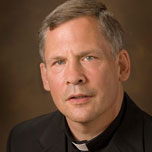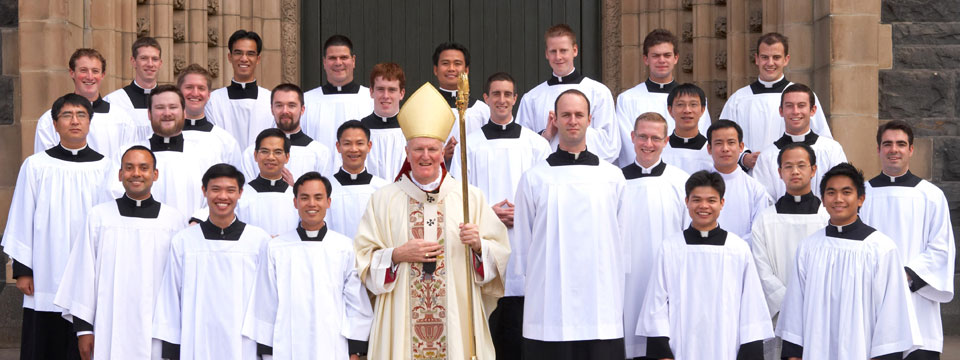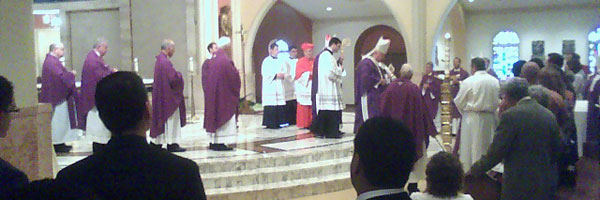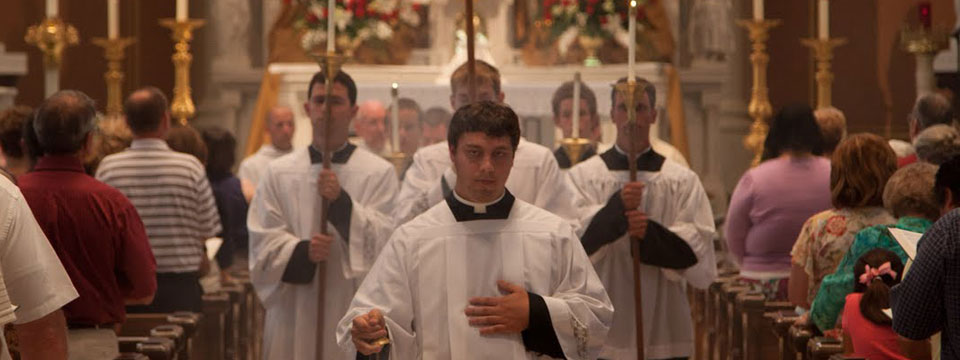Living the mystery
I have titled today’s talk, “The Priest as Evangelical Witness,” and in doing so am picking up on a point made the last time I addressed the ACCC (see, “Practice what you teach,” The Priest, November 2002 and “Believe what you read”, The Priest, May 2003). In the course of that lecture five years ago I quoted a line from the former Archbishop of Paris, Emanuel Suhard, in a retreat given to his own clergy in the 1940s. Cardinal Suhard singled out the priest’s duty to serve as a witness, and said:
To be a witness does not consist in engaging in propaganda, nor even in stirring people up, but in being a living mystery. It means to live in such a way that one’s life would not make sense if God did not exist.
Heathendom, of course, is perfectly comfortable with selfinterest, and the heathen ordinarily shrewd in spying it in operation among other men. “If you love those who love you,” asks our Lord, “what reward have you? Do not even the tax collectors do the same? And if you greet only your brethren, what more are you doing than others? Do not even the Gentiles do the same?” It makes sense to seek one’s own satisfaction, one’s own comfort, one’s own advantages – assuming, of course, that we live in a world in which there is no true reason for nobility, or selflessness, or disinterested love, a world in which we will never be called to account for our choices, a world in which there is no God. Conversely, to be a living mystery, to act in a way that cannot be understood except as a response to imperatives greater than the self, is to direct the minds of others toward the source of those imperatives. It is to be a witness.
Witness of celibacy
Perhaps the way in which the mystery of which Suhard speaks is most strikingly evidenced is by way of the evangelical counsels of poverty, chastity, and obedience. It’s noteworthy that, in the Dogmatic Constitution on the Church of Vatican II, Lumen Gentium, these counsels first find mention not in the chapter on the religious state, but in the prior chapter on the Church’s Universal Vocation to Holiness. The practice of the counsels, under the impulsion of the Holy Spirit, undertaken by many Christians, either privately or in a Church-approved condition or state of life, gives and must give in the world an outstanding witness and example of [the holiness of the Church]. (LG #39)
Not all clergy, obviously, are constrained by vows to live according to these evangelical counsels, yet I’d contend any priest, whether diocesan or religious, who is sincerely striving for holiness permits the counsels to shape his life in a way congruent with his circumstances. They constitute three axes, as it were, in which we understand the project of the imitation of Christ.
Celibate chastity, without question, is the most dramatic witness borne in ordinary circumstances by the priest today, for the obvious reason that chastity is the aspect of priestly life most dramatically at variance with the obsessive preoccupation with sexual gratification by which our culture is marked. Among all the heathen, among most non-Catholic Christians and many Catholics as well, priestly chastity is uniquely perplexing, and consequently, uniquely eloquent testimony to Him for whose sake the satisfactions of the flesh are renounced. It’s hard to overstate the force of that testimony. Even priests manifestly defective in other respects – men who are lazy, choleric, untruthful, or coarse – are viewed by the faithful (and not only the faithful) with the recognition that there is a mystery of love deeper than their patent deficiencies, a mystery tied to their celibacy. It makes no sense, if God does not exist. It makes no sense, unless God is lovable even to human unloveliness.
We’ve all been told that mandatory priestly celibacy is not irreversible and that in the future the requirement may be abrogated. I don’t believe it will happen, but if it were, it’s clear that the non-celibate priesthood would be diminished in mystery – not less pious, necessarily, but tamer, more task-oriented, more “bourgeois” (by which I mean partaking of the pedestrian concerns and fashions of the life of the mid-level bureaucrat). The atheist or half-Christian would see a married priesthood as a sensible innovation, and the very things that make it reasonable in their eyes deprive it of witness value.
And chastity as spiritual chastity
I would enter two words of caution here. First, not a few priests of my acquaintance are, perhaps, overly impressed by the sacrifice they make as celibates. Some are led to permit themselves any other indulgence by way of compensation for their celibacy. Such indulgences not only weaken the testimony given by chastity, but they tend to weaken a man’s capacity to remain chaste (after all, there’s a single will choosing to renounce or to succumb). Of this more later. Second, it sometimes happens that a priest views his celibacy as requiring no more than sexual abstinence, and he feels himself at liberty to involve himself in romantic friendships – often, deplorably, under a spiritual pretence – provided no embraces or sexual congress take place. This is self-delusion. I’ve known priests who, as the woman in question was married and her husband uninterested in religion, had awarded themselves a kind of Pauline privilege, ostensibly supplying the spiritual companionship she wanted from her husband and did not receive. When, as sometimes happens, Father’s amitié amoureuse alienates his companion from her husband, he is offending against the integrity of a marriage, even if physically chaste. The witness such a man gives to the husband in this situation does not bear thinking about.
That said, in spite of the manifest failings of the Catholic clergy in matters of chastity, that chastity remains a living mystery, paradoxically fascinating even to those secularists who reject it. This was evident on one level from the preoccupation of secular media with the sexual dimensions of the Vatican’s criteria for seminary admission, and it’s evident on another level in those aspects of clerical life that scoffers hold up for ridicule. When partygoers garb themselves in fancy dress as a priest or a nun, which of the evangelical counsels is to the fore in their mockery? Exactly.
Obedience as witness
The evangelical counsel of obedience is usually less dramatic in its impact, but not without effect. The demeanor a priest exhibits in accepting an uncongenial post, for example, can speak a lot to those around him about the place of God in his life. Here the contrast with lay and heathen life is not so sharp (almost everyone is subject to some vexing authority in various aspects of his life), but again it is the gratuitousness of the priest’s donation of self that can make the difference.
I was recently told of a book in which a woman describes her fixing brunch for a monk whom she had invited to her house. She asked him, “How do your like your eggs?” and the brief tilt of his head and look of incomprehension told her, incontrovertibly, that he’d never had a way he liked his eggs. He’d simply eaten what was put in front of him. The incident lasted only an instant, but it made a deep impression on her, regarding the texture and meaning of a life lived so differently from her own. The occasion may be trivial, but the sign value is not. Not only monks but every priest has forfeited areas of discretion in his life that the people around him take for granted. The point is that people are watching, people are measuring a priest’s renunciations and indulgences against his stated commitments by way of trying to understand what makes him tick. Freely offered obedience serves not only to edify, but to strengthen the faithful in their own obligations.
To make use of an analogy from another walk of life, military officers often receive unwelcome orders from their own superiors and must pass them on to their troops. The troops will almost always be able to tell whether their officers find the orders congenial or not, yet the key factor is not whether the commands are welcome to those officers, but the alacrity with which they are received as commands. Any inflection of sarcasm or dismay or contempt that creep into an officer’s manner in relaying commands from above will, in effect, give his troops permission to tailor their obedience to their own convenience. By the same token, a priest’s alacrity in carrying out assignments to his disadvantage communicates the presence of a supernatural order of grace according to which he sets his priorities and makes his decisions. It exemplifies the death to self that John the Baptist exemplified as necessary to the coming of Christ: he must increase, John said, but I must increase.
Poverty as witness
The evangelical counsel of poverty is one of the pivotal issues of priestly discipleship and one of the most difficult to talk about in concrete terms. My own experience of religious life is that community discussion of “poverty issues” is exceptionlessly ugly – partly because almost everyone feels vulnerable to criticism in some aspect or other of his life, partly because there’s an unspoken recognition that poverty and chastity issues are not entirely unrelated. Today’s questions of religious poverty, moreover, are detached from the classic ascetical Christian tradition in a way that the other evangelical counsels are not. We sense a certain cultural continuity in reading what Augustine or Alphonsus Liguori has to say about chastity and obedience, because for the relevant purposes we continue to live in their world. But social and economic changes have made it the case every clergyman and religious in the First World enjoys a degree of physical comfort and security impossible for all but the very wealthiest nobles prior to the 19th century – and this irrespective of the severity of his chosen austerities. In fact, bashfulness about using the word “poverty” of our renunciation of ownership of property has brought it about that many religious communities speak about “simplicity of life” instead.
Granted all this, the way we priests eat, dress, recreate; the vehicles we use and the way we furnish our living quarters, such things are subject to the same ceaseless scrutiny by the world. “To be a witness,” says Cardinal Suhard, “means to live in such a way that one’s life would not make sense if God did not exist.” Well, what do our elected comforts and discomforts witness to?
There are two equal and opposite errors to be avoided here. One is a pharisaical rigorism that finds any superfluity (a cigarette, a novel, a second glass of wine) to be a cause of disedification that delegitimises one’s priestly life. This path, unless carefully signposted by living saints, leads to madness. Its contrary is a self-administered moral anaesthetic that excuses any priestly indulgence on the grounds that the labourer is worthy of his hire. As I mentioned earlier, there is a tendency for priests to think that the sacrifices made in the order of chastity justify compensation in the form of any and all carnal refreshment provided it’s non-sexual, whence it’s easy to tumble into a life of pleasure-seeking bachelordom, collecting the usual boy-toys, watching the movies and frequenting the bars and overlapping, to some extent, the recreations of the young professional bronco. Too often, as we know, the overlap becomes total. But more importantly, there comes a point at which the witness we give in other aspects of our life is impaired by concern for personal comforts – and this not by pharisaical envy but by honest dismay given to the good-willed faithful. (One bonus of the Catholic-interest blogs – for those familiar with this world – is that it lets us hear the candid and uncensored opinions of layfolk about us their clergy: opinions which are overwhelmingly, almost miraculously charitable in the main, but which also include the blunt observation that, when excess or luxury in food, drink or comfort is used as a substitute for sex, it’s hard to see the resultant chastity as a spiritual renunciation at all.)
Adhering to what befits the clerical state
I make no distinction between diocesan and religious clergy in these matters. On the one hand, any vowed religious who really wants to can, in my experience, find a way to obviate his obligations of poverty by shrewd exploitation of prosperous lay friends and the perquisites of his own job. A Jesuit so inclined can live as sumptuously as a diocesan priest who enjoys a large private income. On the other hand, Can. 282 §1: – “Clerics are to follow a simple way of life and avoid anything which smacks of worldliness” – applies to diocesans as much as to religious, and the same is true of Can. 285 §1: “Clerics are to shun completely everything that is unbecoming to their state,” and §2: “Clerics are to avoid whatever is foreign to their state, even when it is not unseemly.”
While we’re on the subject, another equilaterally operable Canon is #284: “Clerics are to wear suitable ecclesiastical dress, in accordance with the norms established by the Episcopal Conference and legitimate local custom.” It’s obvious to me that local custom is somewhat different in the USA and Australia regarding clerical garb, and I’m not in a strong position to say whether or not it’s legitimate local custom. [The requirement of clerical dress applies in Australia: see The Priest, November 2001, pages 10-12.] But one of the advantages of giving a drive-by harangue of the present kind is that I can light a fuse to a powder-keg of ecclesiastical controversy, secure in the knowledge that I’ll be out of harm’s way when the detonation takes place.
So here goes. My own conviction is that most priests most of the time are consulting personal convenience rather than Apostolic impact on occasions when they choose to put off the Roman collar and dress in mufti. God knows I am not insensible to those conveniences. Further, there are some unpredictably urgent tasks for which clerical attire is ill-suited, such as painting the ceiling of the presbytery or changing the transmission fluid on the parish van. In April of 1999, during a tertianship experiment, I found myself in central NSW helping with pregnancy testing on a beef herd, shoulder-deep into a bemused heifer, and I admit that I permitted myself a derogation from Canon 284 in favour of the loin of the non-baptised party. There are circumstances in which even Pius XII would lay aside his clergy stock ad majorem Dei gloriam. That said, such circumstances are rarer than commonly acknowledged. I generally apply what I call a “two ring test.”
External signs of state of life. We all know of married men who yank the wedding ring off their finger before leaving on their “boys’ night out,” and it’s sometimes the case that priests put off the external signs of their priesthood for analogous reasons. Mufti lets a priest go to the kind of bars and restaurants and movie theatres that a man in clerics would be shy of entering. It lets the priest stare at skirts (etc.) that cross his path without provoking more than the usual indignation. It lets a priest buy the kind of reading material that would raise eyebrows otherwise. It frees the priest from the public pressure to edify – or at least not to be disedifying. In mufti the priest can flip off people who cut him off in traffic and deal brusquely with panhandlers and quarrel with salespeople and waiters and airline personnel – all the while emancipated from the duty to uphold an institutional reputation.
Living with the inconveniences of a public state of life. The second ring derives from Tolkien’s famous trilogy. This is a ring not removed but rather worn in circumstances of need. Its property is to render the wearer invisible. Mufti, as we all know, gives the priest the ability to reveal his priesthood to those he wants and withhold it from those he wants. He can run with the hares or hunt with the hounds as the advantages of the particular social situations dictate. In the USA, a few years ago at any rate, the detestation directed at priests at the height of the clerical abuse scandal moved some priests to wear civvies as a kind of camouflage. Less dramatically, most of us have faced the prospect of a long plane flight in which we longed to be free of the importunities of fellow travellers and to journey instead as Mister Average Passenger. However, turning oneself into Mister Average Passenger – for a priest – is like Frodo Baggins putting on the Ring in order to avoid his cousin Lobelia. It’s a sneaky way out that makes him a tiny bit more cowardly every time he takes it. Many resort to the expedient, few take pride in it. Summing up, I’d contend that, on those occasions when removing one’s collar is not yanking off a wedding ring and when donning mufti is not slipping-on Tolkien’s ring, then it’s a responsible choice – neither an instance of taking the easy way out nor of laying aside one’s duty.
To repeat: the Canons that touch on priestly worldliness, as well as the spiritual dispositions that give them force, apply equally to religious and diocesan clergy. As underlined by the cry of John the Baptist mentioned above, the point of these cautions against profane indulgences is that noisy self be eclipsed by the person of Christ. With the exception of priests who are strictly cloistered monks, we’re all in the same boat.
Asceticism as witness
Yet the mention of monks is not wholly beside the point. One of the huge post-Conciliar losses to the priestly life generally has been the sea change in the model of contemplative life: a life once aimed at mortification – a death to self through asceticism – now aimed at self-actualisation. The “self” has taken centre stage. This change is important because, in spite of 50-plus years of propaganda to the contrary, the monastic ideal remains a potent icon in any priest’s self-understanding. Obedience, simplicity of life, and fidelity to prayer have different orientations in the case of a canon, a friar, and a diocesan priest, obviously, but they are all monastic in transmission and all essential to the clerical life. Where monastic life is healthy, it builds up even non-monastic parts of the Church; including and in particular the lives of priests in the active apostolate. Where monastic life is corrupt or lax, the loss extends to the larger Church as well – it’s as if a railing were missing on one side of a balcony. When I was preparing for priesthood my teachers lamented what they called the “monastic” character of pre-conciliar seminaries and houses of formation (fixed times for common prayer, silence, reading at meals, etc.), complaining that such disciplines were ill-suited to their lives because they were destined not to be monks but pastors, missionaries, and scholars. But looking at the lives of my contemporaries, one of the things I find most obviously lacking is an appetite for prayer created by good habits of prayer – habits that are usually the product of a discipline we never had. The same is true of asceticism and self-denial generally. When laypersons enter a priest’s living quarters, for example, they don’t necessarily have to be shocked by the austerity, but they ought to walk away with the impression that the man who lives there is good at saying No to himself. And monks are, or used to be, our masters at saying No to the Self.
Shifting the focus to the One to whom we witness
It is not my purpose to erect some kind of mental tribunal in which each priest brings evidence against himself. The point of Cardinal Suhard’s dictum was not that his priests should exculpate themselves of wordliness, but that they should shift the focus off themselves entirely to give witness to God. They do this by being a living mystery, and that means to live and move and have one’s being in a universe opaque to the worldly.
This opacity of spiritual goods to the eyes of the ungodly has been wittily expressed by C. S. Lewis is his spiritual classic, The Screwtape Letters. It takes the form of a fictional correspondence in which a senior demon coaches a junior in the damnation of a human soul assigned as his target. At one point Screwtape takes a step back from concrete advice to vent his exasperation at the impossibility of understanding God’s motives. God, in this correspondence, is simply called The Enemy:
The truth is [writes Screwtape] I slipped by mere carelessness into saying that the Enemy really loves the humans. That, of course, is an impossibility. He is one being, they are distinct from Him. Their good cannot be His. All His talk about Love must be a disguise for something else – He must have some real motive for creating them and taking so much trouble about them. The reason one comes to talk as if He really had this impossible Love is our utter failure to out that real motive. What does He stand to make out of them? That is the insoluble question…. We know that He cannot really love: nobody can: it doesn’t make sense. If we could only find out what He is really up to! Hypothesis after hypothesis has been tried, and still we can’t find out.
Of its nature love is incomprehensible to Screwtape (at one point he writes of a Christian household, “We are certain (it is a matter of first principles) that each member of the family must in some way be making capital out of the others – but we can’t find out how”), by the same token the fact that there is no capital to be made out of our poverty, chastity, and obedience is nonsense to the dogmatic atheist.






